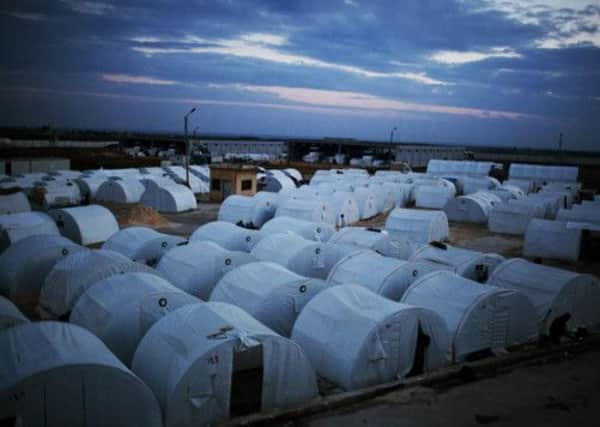Egypt turning on Syrian refugees


Backed by Egypt’s lenient visa policy, some opened grocery stores or snack stands and prided themselves on feeling like residents, not refugees. It was a similar story across greater Cairo.
That all changed in a few days in early July after millions took to Egypt’s streets and the military stepped in to topple the country’s Islamist president Mohamed Morsi. Suddenly Syrians found themselves unwillingly caught up in another uprising.
Advertisement
Hide AdAdvertisement
Hide Ad“Here we’re in the middle – not rich, but not the poorest,” says Yasser, 38, a Faisal resident originally from Latakia who now manages a school for Syrian children. “We live amongst Egyptians and try to earn and eat as they do, but it’s becoming harder. Sometimes it feels like the link between us is fraying.”
Now many of the tens of thousands of Syrians here have found themselves targets of hate speech in local media. TV stations critical of Mr Morsi aired claims his Muslim Brotherhood was paying Syrian refugees to attend pro-Morsi protests. Other outlets reported Syrians among those arrested in clashes with police.
One TV anchor, Tawfiq Okasha, declared that Egypt should form a “defence army” and arrest Syrians, Palestinians and Iraqis he claimed were causing trouble. Through it all, journalists covering recent pro-Morsi demonstrations have yet to report meeting a single non-Egyptian protester.
Before long it filtered down to the streets. Most Syrians interviewed talk of isolated, if worrying, incidents of harassment: a knife pulled by a thuggish local who hears the tell-tale Syrian dialect; local transport refusing rides. Police have stepped up ID checks, with Syrians living on expired visas fearing detention, or worse, deportation.
The Scotsman caught a glimpse when asking for directions in the Giza backstreets. “Syrians, Palestinians, Lebanese, they can go to hell,” one young man yelled. “Anyone who isn’t Egyptian shouldn’t be here.”
Over the last two weeks, Egyptian officials have turned back at least one planeload of Syrians arriving at Cairo airport. Syrians now need to obtain visas before entry and there’s no sign Egyptian embassies are granting them. New arrivals used to receive a three-month visa and could eventually apply for one-year residency – that’s no longer the case.
The United Nations says some 70,000 Syrians have registered with them in Egypt, but the real number here is estimated as at least twice that. Syrian activists tracking arrivals put it as high as 350,000.
With no official aid programme, Syrians experience vastly different conditions. On the fringes of the capital are grim informal settlements where overcrowding, failed services and rampant crime leaves Syrians and Egyptians alike living in misery.
Advertisement
Hide AdAdvertisement
Hide AdA half-hour drive west of Cairo, the satellite city of 6th October is home to many of the more fortunate. In a buzzing central district, a restaurant named after a beloved Syrian TV serial serves up hummus late into the night.
At a barbershop, Abdel-Rizk gingerly scrapes the stubble from a impatient customer. “All of a sudden we’re hearing these comments – ‘what are you doing here? Go back home,’” says the20-something. “We’re worried about being deported suddenly.”
His customer pipes up: “My brothers arrived at Cairo airport last week and they wouldn’t let them in. They had to wait overnight then they put them on a plane back to Beirut.”
For others the long-term uncertainties of life in Egypt outweigh the latest threats. “My wife and children are nervous but I’m not,” says Nabeel Haroub, 56, who fled Damascus earlier this year. “Egyptians are kind, genuine people. This is just propaganda that’ll blow over.”
Nonetheless, the rapid change in government policy and its effect on attitudes came as a shock, says Sima Diab, a Syrian activist based in Cairo. “There’s still an abundance of good will out there in Egypt, but the fear is that Syrians will become a punching bag,” she says. “It doesn’t take many people to cause trouble for us.”